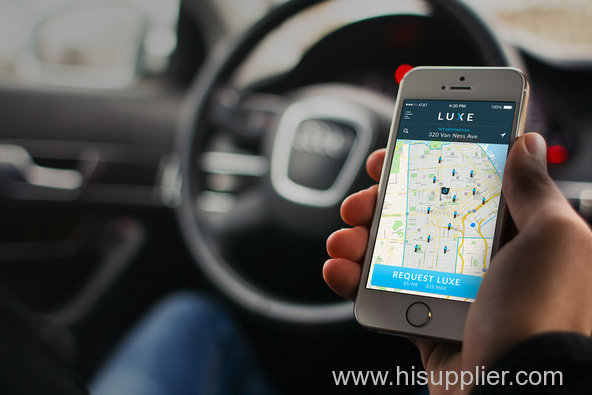Luxe Valet App Eliminates the Heada...
Luxe Valet App Eliminates the Headache of Finding a Parking Spot

Every few years, I come across a new tech service that completely upends how I navigate urban life.
It happened with Amazon Prime, the subscription plan that turned Jeff Bezos' online store into my primary shopping destination. It happened with Uber and Lyft, the ride-hailing companies that reduced how often I use my car, and killed my aspirations to ever buy another one. Now it has happened again, with a new company that has instantly solved one of the most soul-destroying hardships of living or working in San Francisco: parking.
The company is called Luxe Valet. When I describe it to you it will sound crazy, bourgeois and inefficient, and your first instinct will be to dismiss it. Don't. Luxe works amazingly well, and as it and other similar services expand nationally — Luxe is starting up in Los Angeles this week — they could radically alter how large cities work.
Luxe is an on-demand valet parking service. When you need to drive somewhere where parking is tough, like pretty much any part of San Francisco, open up the app and tell it where you'll be going. Then start driving. When you get to your destination, a valet will be waiting for you on the side of the road. He's wearing a blue jacket bearing the Luxe logo, and he greets you by your name, so you know he's legit.
Hand him your car keys. Yes, don't worry, it's fine. Luxe is insured for $1 million against theft and damage, and it tracks your car with GPS. So, as I said, hand him your car keys. Tell him how long you'll need your car parked. Watch him drive away with your car. If you want, you can look at the app to see a little icon representing your car making its way to a parking lot.
That's it. Your car has been parked.
Later on, when you need your wheels, open up the app again and hit the button to call back your car. Luxe will assign you a valet, and you'll see the return play out right there on you phone's screen — a valet approaching your parked car, and then the car heading to you. In about 10 minutes, your car arrives. One nice perk is that your return destination can be anywhere in Luxe's service area, not necessarily the place where you originally parked your car. You can drive your car into the office in the morning, then have it returned to you that night after dinner in another part of town.
But here's the best part. Luxe costs just $5 an hour, with a $15 maximum daily rate. If that doesn't sound freakishly cheap to you, you haven't parked in San Francisco. In crowded areas during the workday and on weekend nights, just about every parking garage charges more than Luxe. Around the New York Times' bureau in the busy South of Market area of town, the parking lots range from $17 to $30 a day, many of them offering no hourly rate. (That is, you pay $17 even if you're there for just an hour; Luxe offers prorated rates.) Street parking goes for about $4 or $5 an hour, but you won't find a spot unless you've signed your soul over to the devil.
Luxe is the buzziest of a handful of valet apps that have begun service in the last few months. There's also ZIRX, which operates in San Francisco and Seattle, and ValetAnywhere, which is in New York. To constrain its growth, Luxe has set up a waiting list for the app; download it, sign up, and you'll get to use it in a few days time. In the Los Angeles area, the company plans to begin operating in Venice and Santa Monica, some of the toughest places to park in that car-obsessed city.
When I first heard about these apps, I thought they were crazy. Even if such apps did work, their long-term future looked cloudy. Uber and Lyft want to reduce private car ownership and increase carpooling; as I've argued before, they look like they're making good on those plans. Isn't an app like Luxe, meant for car owners, pursuing a distinctly antiquated goal?
In an interview at Luxe's San Francisco headquarters, where the service has been in operation for three weeks, Curtis Lee, the company's co-founder and chief executive, explained the economics of the service. Across a given city, he said, demand for spots is uneven. In busy times, parking lots in busy areas get filled to capacity, but other lots in less trafficked parts of the city remain unoccupied. Luxe has contracted with the city's large parking companies to fill out these underutilized lots. By paying a valet to shuttle your car from a busy area to a less-busy one, Luxe "smooths out demand," Mr. Lee said.
Because Luxe pays its valets an hourly wage and pays fixed monthly prices for the parking spaces it leases, Mr. Lee says that Luxe can turn a profit with high enough volume.
"We are making money now at certain times," Mr. Lee said. "Say we pay $200-per-month for a space that we lease out. If we turn it over X amount of times, per-unit it becomes much cheaper. Even with our small scale now, we can definitely turn a profit at certain times in certain areas."
As it improves its operations — getting more spaces at lower prices, or figuring out better places to position its valets so that they can park more cars per hour — the company argues that it can lower its costs even further.
"I do think that Uber and Lyft will cause some people to say that they don't need a car anymore," Mr.Lee said. "But there's still a huge, huge use case of people that still drive." And for them, parking has just been solved.
Previous:
Working the Land and the Data
Next:
Amazon and Hachette Resolve Di






